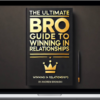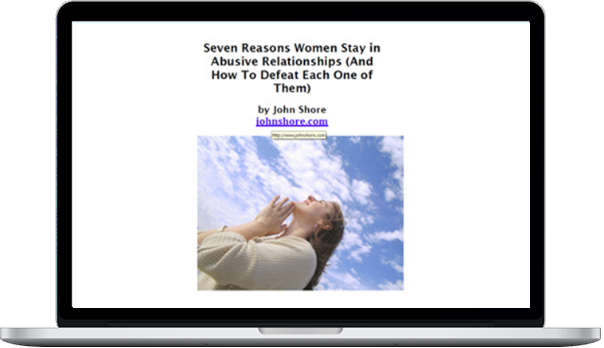John Shore – Seven Reasons Women Stay In Abusive Relationships
$37.00 $9.00
»Delivery: Within 24hs
Description
John Shore – Seven Reasons Women Stay In Abusive Relationships
Description Of Seven Reasons Women Stay In Abusive Relationships
Last time we talked about … well, snarky rhyming leprechauns, actually. But pursuant to my series Seven Reasons Women Stay in Abusive Relationships (and just before Christian Leaders: For God’s Sake, Stop Empowering Wife Abusers), we talked, in Women in Abusive Relationships: Like Everyone Else, You’re Guilty of Love, about the truth that if we are living in an unhappy or dysfunctional way, we can be sure it’s because, in one way or another, we are being as loyal as we possibly can to the ideas and values that our parents taught us about ourselves, the world, and how those two just “naturally” interact.
So let’s talk about that just a little more, because in the course of our lives there is no more important a subject for us to deal with. (As to the relationship between religion/God and our psychological well-being, it’s true, as I said in Women in Abusive Relationships: The Good Daughter Syndrome, that what stands between us and our psychological health also stands between us and the healing power of God.) Our present and future is necessarily defined by our past.
You can’t be who you want to be without understanding how you got to be the way you are. No one gets around that. And how did you begin your journey toward the person you are today? As a fully dependent child.
Now, let’s say that as a child you had emotionally dysfunctional parents. (Phffft. Like anyone didn’t. But I digest ….) What do emotionally dysfunctional parents do? They constantly teach their children all kinds of crazy, wrong, and eminently unhelpful things about themselves, others, and the world in general. They can’t help it. They do what they are. And how do children respond to the Toxic Life Lessons taught them by their emotionally dysfunctional parents? They believe them, that’s what. They absorb them as absolute truths.
They accept them before the conscious process of “acceptance” at all. What our parents teach us, especially and particularly about who we are (since that’s the information we’re most voracious about collecting), becomes, right off the bat, so deeply interwoven into our most foundational and bedrock conceptions of ourselves and the world that unless later in our lives we work very, very hard to discern between larger, healthier truths and the little, tweaked “truths” that our parents downloaded directly into our (so to speak) motherboards, then we end up stuck in the little, broken boat our parents fashioned for us, which can never do anything but float around in the same old limited loop their boat is forever stuck in.
Worse than all this: The real message dysfunctional parents send their children is that their children are in danger. That is the primary message received by children in messed-up families: You could die here. Things are crazy here. You are not loved here. Your survival is at risk here. That’s not an exaggeration: it’s how kids feel if the primary message they’re getting from their parents is, “My craziness is more important to me than properly loving you is.”
How else can they respond to that message? They’re totally dependent upon their parents’ well-being and love. And that’s not something they’re unaware of. They’re not. They know it. They know that if their parents are erratic, or hostile, or out of control, or crazy in any real way, they’re in trouble. On the most basic, animal level, they understand that means their safety is endangered.
They’re scared, man. And here’s what scared kids in crazy families tell themselves about their parents: They really love me. Kids tell themselves what they must in order to secure for themselves the emotional security they need just to survive in their house, which is that underneath it all–underneath their anger, their selfishness, their fear, their passivity, their physical or emotional abuse–their parents really love them. Sure, Dad hit us. But he loved us.
Sure, Mom drank too much. But she loved us. Sure, Dad was never home. But he loved us. Sure, Mom refused to stand up to Dad. But she loved us. We all do it. We all hold dear to the myth that as children we had to create for ourselves, which is that our parents are deeper, nobler, kinder, more thoughtful–that they’re just better people–than the people whom we in fact know them to be. And besides that for our survival we must, do you know why else we cling so mightily to the Good Parent myth?
Because we love our parents with a furious, instinctive devotion the power of which is unmatched in the human experience. And there’s the package of our lives: We love our parents, and as children we must believe that underneath it all our parents are wonderful, enlightened people who always have and always will love us. And then as adults we find ourselves allowing ourselves to be abused. Or we habitually abuse ourselves, with alcohol or drugs. Or we eat too much. Or we don’t allow ourselves to eat enough.
Or we’re the ones hurting and abusing the people we’re supposed to love and protect. And when your personal life has for too long gone too awry, you finally reach the point where you realize that you have to start reassessing knowledge that’s as core to who you are as your skin and your teeth. That’s when it’s time to start that process by which, ultimately, you decide that it’s more important that you stand up straight and let your parents fall off your back than it is for you to continue your life hunched over from the weight of carrying them.
About John Shore
“John Shore is one of those rare writers who can make people laugh and think at the same time. He’s one of the most talented, funny, and deeply thoughtful writers I know. He’s a sincere pleasure to read.”– Richard Louv, author of the international bestseller, Last Child in the Woods, and Fly Fishing for Sharks.
John Shore is a remarkably gifted writer who knows exactly what he is doing.” — Jacquelyn Mitchard, author of The Deep End of the Ocean (an Oprah’s Book Club selection), Twelve Times Blessed and The Breakdown Lane.
“John Shore, the legitimate son of Kurt Vonnegut and Dave Barry, writes with a freaky energy and humor and imagination that illuminate his characters’ and readers’ hearts. He’s the real thing.”– Richard Lederer, author of more than thirty books on the English language, including the bestselling Anguished English series and A Man of My Words.
“John Shore is a humorist whose work is more comedic than Donald Miller, and his appeal to Christians is more direct.”–Michael Spencer, a.k.a. The Internet Monk
Hi. My name’s John Shore. I write for a living. Which is better than having a real job, and no two ways about it. Which isn’t even a complete sentence. So you can see how exacting the standards are for becoming an Actual Writer. Whoo-hoo!
In the world of secular/mainstream books, I’m represented by Deborah Schneider, of Gelfman Schneider. My agent to the world of the CBA (Christian Booksellers Association) is Greg Johnson, of Wordserve Literary Group.
My first book, published in 2005 by Seabury Books, was/is Penguins, Pain and the Whole Shebang: Why I Do The Things I Do (by God, as told to John Shore). This book is my best shot at once and for all proving to non-Christians that just because someone is a Christian doesn’t mean they’re insane and/or incapable of rational thought. You can read more about Penguins here. A German edition of Penguins came out in late 2007; a Korean edition is in the offing. Or off the iffing. Or … something good, anyway.
My second book, which I co-wrote with Famous Grammarian guy Richard Lederer (author of the bestselling Anguished English series, among others) is Comma Sense: A Fun-damental Guide to Punctuation (St. Martin’s Press, 2005). First it came out in hardback; then we did a second printing in hardback (whoo-hoo!), then it came out in paperback (whoo!). You can read more about Comma Sense here.
You can read here about my third book, I’m OK-You’re Not: The Message We’re Sending Nonbelievers, and Why We Should Stop (NavPress, 2007).
With Steve Arterburn (author of the Every Man series), I’ve also co-authored three books: Midlife Manual for Men (Bethany House, 2008), Being Christian (Bethany House, 2008), and Regret Free Living (Bethany House, 2008).
Before I started writing books, I worked as an editor and/or writer for (among others) San Diego Magazine, The San Diego Union-Tribune, The San Diego Reader (the third largest alternative weekly newspaper in America), and San Diego’s KPBS (one of the largest public broadcasting companies in the country). I have also done extensive writing for websites E!Online, Microsoft’s San Diego Sidewalk, and AOL’s Digital City San Diego. I’ve also published fifteen short stories in little literary magazines all over the country.
Before all that I worked as (among other things): a recreation leader, door-to-door encyclopedia salesman (I never sold one set), shoe salesman (good at selling shoes that people already wanted; awful at selling job-securing purses and socks I was supposed to inspire them to want), pizza “chef,” 7-11 clerk (graveyard shift at the most-robbed 7-11 in northern California!), shipper-and-receiver, Taco Bell miscreant, nanny (for the Rothschild family!), Macy’s stock boy, truck-loading Teamster, janitor, bookstore clerk, data input drone, Trader Joe’s “shipmate,” Jiffy Lube monkey, law office flunky, and church relations manager for a Rescue Mission.
I grew up–well, I got older–in the San Francisco Bay Area town of Cupertino, California, which when I was a kid was mostly orchards and tract homes, but later became the very heart of Silicon Valley. Talk about your little town disappearing.
I have been married 30 years to a woman who gives whole new meaning to the word “patient.” Catherine is by far and away the smartest, kindest, funniest, wisest person I’ve ever met. About 100 times a day she basically freaks me out with her Giant Brain and her infinite capacity for immediate, absolute love.
More courses from the same author: John Shore
Delivery Policy
When will I receive my course?
You will receive a link to download your course immediately or within 1 to 21 days. It depends on the product you buy, so please read the short description of the product carefully before making a purchase.
How is my course delivered?
We share courses through Google Drive, so once your order is complete, you'll receive an invitation to view the course in your email.
To avoid any delay in delivery, please provide a Google mail and enter your email address correctly in the Checkout Page.
In case you submit a wrong email address, please contact us to resend the course to the correct email.
How do I check status of my order?
Please log in to DatingCourse account then go to Order Page. You will find all your orders includes number, date, status and total price.
If the status is Processing: Your course is being uploaded. Please be patient and wait for us to complete your order. If your order has multiple courses and one of them has not been updated with the download link, the status of the order is also Processing.
If the status is Completed: Your course is ready for immediate download. Click "VIEW" to view details and download the course.
Where can I find my course?
Once your order is complete, a link to download the course will automatically be sent to your email.
You can also get the download link by logging into your DatingCourse account then going to Downloads Page.
You may also like:
- See more 2 Girls Teach Sex courses
- See more 60 Years of Challenge courses
- See more Adam Armstrong courses
- See more Adam Gilad courses
- See more Adam Lyons courses
- See more Arash Dibazar courses
- See more Bobby Rio courses
- See more Carlos Xuma courses
- See more David Deangelo courses
- See more David Shade courses
- See more David Snyder courses
- See more David Tian courses
- See more David Wygant courses
- See more Dean Cortez courses
- See more Derek Rake courses
- See more FortWorthPlayboy courses
- See more Gabrielle Moore courses
- See more Helena Nista courses
- See more James Marshall courses
- See more Jason Capital courses
- See more Jean Marie Corda courses
- See more Joe Lampton courses
- See more Jon Sinn courses
- See more Lloyd Lester courses
- See more Love Systems courses
- See more Marisa Peer courses
- See more Matt Cook courses
- See more Matt Granger courses
- See more Nick Krauser courses
- See more Pleasure Mechanics courses
- See more Ross Jeffries courses
- See more Talmadge Harper courses
- See more The Modern Man courses
- See more Tom Torero courses
Related products
Total sold: 5
Total sold: 53










